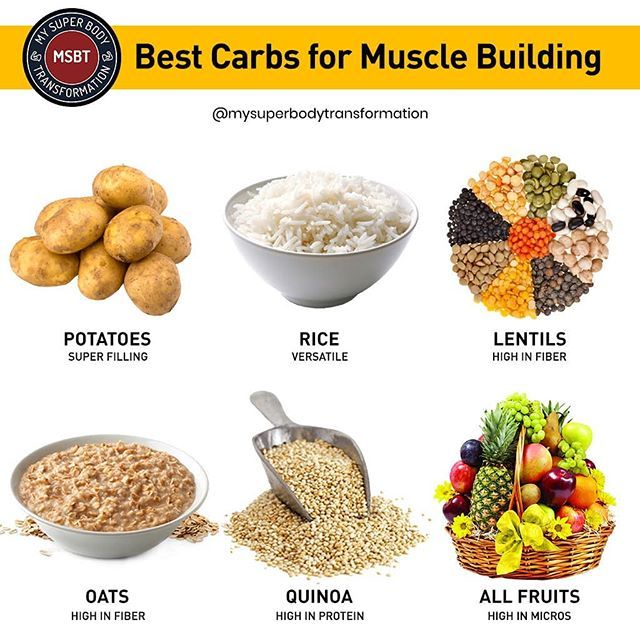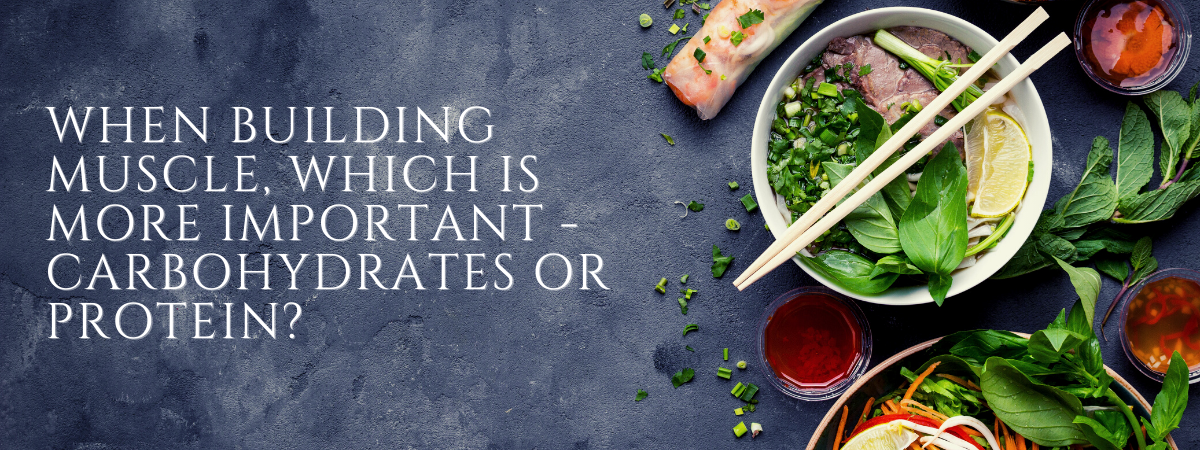Effective Strategies for Using Carbohydrates for Muscle Building in 2025: Boost Your Strength Now!
When aiming for muscle growth, understanding the role of carbohydrates in your diet is crucial. Carbohydrates are not just energy sources; they play a pivotal role in muscle synthesis and recovery. With the right knowledge of how to optimize carbohydrate intake, athletes can maximize their performance and achieve significant gains. This article provides insights into effective strategies for using carbohydrates to enhance muscle building, covering everything from choosing the right types of carbohydrates to timing your intake.
We will explore the importance of carbohydrate quality, the role of glycogen storage, ideal nutritional combinations, and practical dietary strategies for both pre- and post-workout sessions. Finally, you’ll find expert recommendations and tips that can help you tailor your approach for optimum muscle growth and recovery.

Understanding Carbohydrates in Muscle Building
To effectively use carbohydrates for muscle development, it’s essential to grasp the different types of carbohydrates available and how they affect your body. Carbohydrates are typically categorized into simple and complex types. Simple carbohydrates provide quick energy, while complex carbohydrates offer sustained energy release, both crucial during intensive workouts. Understanding the glycemic index (GI) of these carbohydrates can help athletes make informed choices about their dietary intake.
The Role of Carbohydrates in Muscle Growth
Consuming carbohydrates is important for athletes to replenish glycogen stores after training. Glycogen is the body’s stored form of glucose, found primarily in muscles and the liver, which is used as a primary energy source during exercise. Proper glycogen levels are critical for muscle performance and recovery, making strategic carbohydrate intake essential for anyone looking to build muscle effectively.
Simple vs Complex Carbohydrates: What You Need to Know
Simple carbohydrates, such as sugars found in fruits and refined grains, are quickly absorbed and provide immediate energy. In contrast, complex carbohydrates, found in whole grains, beans, and starchy vegetables (like potatoes and rice), release energy more gradually. Athletes should prioritize complex carbohydrates for sustained energy throughout their training sessions while using simple carbohydrates post-workout for rapid recovery.
Glycemic Index: Choosing the Right Carbohydrates
The glycemic index helps athletes choose carbohydrates that align with their workout routines. High-GI foods like white bread and sugary beverages can spike blood sugar levels, giving immediate energy but may lead to a crash later. On the other hand, low-GI foods release energy slowly, ideal for steady endurance activities. Implementing a variety from both categories can enhance overall performance based on individual workout demands.

Optimal Carbohydrate Intake for Athletes
Determining the right amount of carbohydrates for muscle building depends on various factors, including body weight, workout intensity, and training goals. The general recommendation for athletes is to consume a diet consisting of 55-65% carbohydrates. This percentage varies based on individual energy expenditure and muscle-building objectives.
Calculating Your Daily Carbohydrate Needs
The first step in optimizing carbohydrate intake is to assess one’s daily caloric needs based on activity levels. For muscle gain, it is important to maintain a caloric surplus. Typically, athletes may require between 3-7 grams of carbohydrates per kilogram of body weight, particularly on training days. Adjusting carbohydrate intake based on training intensity can help meet specific performance goals.
Timing Your Carbohydrate Intake
Timing your carbohydrate intake can greatly influence muscle recovery and energy levels. Consuming carbohydrates before workouts can enhance performance, while post-workout carbohydrates are crucial for recovering glycogen stores. Strategies like nutrient timing—eating the right foods at the right time—can significantly affect training outcomes.
Examples of Effective Carbohydrate Sources
Some excellent carbohydrate sources include whole grains such as brown rice, oats, and quinoa, which provide fiber and essential nutrients. Root vegetables, like sweet potatoes, are also optimal for their slow-releasing carb content. Fruits such as bananas offer quick energy and are great post-workout snacks. Incorporating these foods into your diet can help ensure that your carbohydrate sources are both effective and nutritious.
Building on these fundamentals, this next section will dive deeper into meal planning and the practical aspects of integrating effective carbohydrate sources into your diet.
Meal Planning for Muscle Growth
Meal planning is a critical component of any athlete’s nutrition strategy. It allows for consistency and helps ensure that the athlete meets their daily macronutrient needs effectively. Proper planning can also help prevent unhealthy snacking and missed meals, which can hinder muscle-building efforts. Practical tips will provide you with the foundation needed for success.
Crafting Your Pre-Workout Meal
Your pre-workout meal is your last source of energy before training. It should consist of easily digestible carbohydrates and some protein to sustain energy levels. A banana with a scoop of peanut butter or a rice cake with yogurt are excellent choices. This meal should ideally be eaten 30 minutes to an hour before working out to maximize energy levels.
Post-Workout Recovery Meals
After a workout, it’s crucial to provide your body with the nutrients it needs to repair and grow. A post-workout meal should contain both carbohydrates and protein. For instance, a smoothie made with protein powder, fruit, and spinach is a quick and effective way to replenish glycogen and facilitate muscle recovery. Alternatively, a chicken wrap with whole grain tortillas offers both macro benefits.
Sample Daily Meal Plan for Muscle Building
Creating a sample meal plan can help visualize carbohydrate intake. For example, breakfast might consist of oatmeal topped with mixed berries and nuts, lunch could include quinoa salad with grilled vegetables, and dinner may feature brown rice with lean meat and steamed broccoli. Snacks throughout the day can include fruit, yogurt, or whole grain crackers, ensuring a balanced intake of protein and carbohydrates.
This naturally leads us to explore additional strategies and common misconceptions surrounding carbohydrates, which will guide you toward achieving your muscle-building goals effectively.
Common Misconceptions About Carbohydrates
Many athletes and fitness enthusiasts fall prey to common myths about carbohydrates, leading to confusion about their actual role in muscle building. Debunking these myths is vital for making informed dietary choices. Understanding how carbohydrates influence your body can help avoid unnecessary restrictions.
Myth: Carbohydrates are Bad for You
One of the most prevalent misconceptions is that carbohydrates lead to weight gain. In reality, carbohydrates are essential for energy and overall health when consumed appropriately. It’s the type and quantity of carbohydrates that matter, not the macronutrient itself. By focusing on the quality of carbohydrates—opting for whole grains and limiting sugars—athletes can enjoy their benefits without negative effects.
Myth: Low-Carb Diets Are Best for Athletes
Another common belief is that following a low-carb diet is optimal for athletes. While some may experience short-term benefits from lower carb intake, most athletes require a sufficient volume of carbohydrates to fuel their high-intensity training and recovery. Proper energy levels are crucial for muscle maintenance and performance. Thus, athletes should aim for an adequate carbohydrate intake tailored to their activity levels.
Reality of Carbs and Muscle Gain
Research shows that carbohydrates play an essential role in muscle synthesis and recovery. By incorporating the right amounts and types of carbohydrates, athletes can enhance their performance instead of sacrificing energy levels. In fact, using carbohydrates strategically in conjunction with protein can significantly improve muscle recovery rates and overall training success.
Expert Tips for Maximizing Carbohydrate Effectiveness
Employing expert strategies will greatly improve your carbohydrate utilization and overall muscle growth. The right approach can streamline the benefits derived from your workouts and dietary practices. Here are some recommended strategies.
Focus on Variety in Your Diet
Diversifying carbohydrate sources is vital for macronutrient variation and nutrient intake. Include a range of foods in your diet to cover different vitamins and minerals essential for performance and recovery. Whole grains, legumes, fruits, and vegetables should all find a place in your meals to optimize nutrition for muscle-building.
Monitor Your Hydration
Fluid intake is often neglected but is crucial for effective carbohydrate utilization. Hydrated muscles absorb glucose more efficiently, leading to better performance and recovery. Athletes should aim for consistent hydration before, during, and after workouts, especially when consuming higher quantities of carbohydrates.
Prioritize Nutrient Timing
Understanding nutrient timing can enhance muscle recovery. Consuming carbohydrates immediately after workouts can dramatically improve glycogen resynthesis, ensuring athletes can back at peak performance for their next training session. Incorporating protein at this stage also supports muscle repair, solidifying the effects of carbohydrate intake.
Q&A on Carbohydrate Use for Muscle Building
What is the best type of carbohydrate for muscle building?
Complex carbohydrates like whole grains, legumes, and starchy vegetables are generally the best choice for muscle building as they provide sustained energy and essential nutrients. Simple carbohydrates can be beneficial post-workout for quick recovery.
How many carbohydrates should I consume per day to build muscle?
The amount of carbohydrates required varies by activity level but generally falls between 3-7 grams per kilogram of body weight for most athletes. It is crucial to assess your training intensity to make accurate calculations.
Should I avoid carbs on rest days?
While you may not need as many carbohydrates on rest days, completely avoiding them is not recommended. Carbohydrates aid in recovery and should be tailored to support overall energy balance, even on rest days.
By focusing on optimal carbohydrate intake and allocation in your meal plans, you can effectively boost your muscle-building efforts and achieve your fitness goals. Utilize these strategic recommendations to enhance performance and promote muscle recovery effectively.
